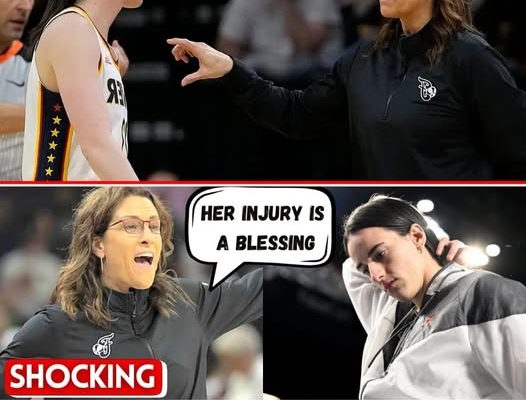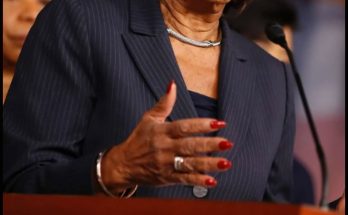
The arena was still buzzing after the final buzzer, but not because of the scoreboard. The game between the Indiana Fever and the Connecticut Sun had already been marked by intense physicality, emotional swings, and a playoff-level atmosphere, even though the regular season was far from over. Yet it was not a highlight reel play or a late-game heroics that sent shockwaves through the sports world — it was a microphone, a podium, and the words of Connecticut Sun head coach Stephanie White.
The press conference had been expected to follow the usual script: coaches dissecting plays, offering praise for effort, and talking about the “one game at a time” mentality. But White arrived at the podium visibly tense, her voice clipped in the opening responses. It didn’t take long before her attention turned toward one player in particular — Caitlin Clark.
“She is a tremendous scorer, I’ll give her that,” White began, her tone measured but laced with irritation. “But there is a big difference between being talented and being a complete basketball player. And there’s a bigger difference between playing hard and playing smart. Tonight, she crossed a line, and someone needs to say it.”
Gasps rippled through the room. Reporters glanced at one another, fingers flying over keyboards. White was not simply critiquing Clark’s performance; she was challenging her professionalism, her maturity, and her approach to the game.
The Game That Sparked the Storm
The Fever entered the night in desperate need of a win. Clark had been electric in recent weeks, carrying Indiana through rough patches with her deep shooting range and fearless drives to the rim. The rookie phenom’s popularity had reached levels rarely seen in the WNBA, and she had become the league’s most talked-about player, generating headlines, social media debates, and fan fervor wherever she played.
The Sun, however, were not interested in playing the role of supporting cast in another “Caitlin Clark Show.” From the opening tip, they brought relentless defensive pressure. Physical play, quick double-teams, and constant traps aimed to disrupt Clark’s rhythm.
The intensity boiled over late in the third quarter. After a hard screen from a Sun forward sent Clark tumbling to the floor, she popped up and exchanged sharp words with the referee, gesturing toward her hip as if to say she had been deliberately targeted. On the next possession, Clark drove into the lane and collided with Connecticut guard Natisha Hiedeman, drawing a whistle for an offensive foul. The crowd erupted — half in outrage, half in celebration.
But the defining moment came midway through the fourth quarter, when Clark, frustrated with a no-call, lingered near midcourt arguing with the officials instead of getting back on defense. The Sun took advantage, pushing the ball up the floor for an uncontested three-pointer. White’s reaction on the sideline — hands thrown in the air in disbelief — would become a viral GIF within minutes.
White’s Postgame Eruption
By the time she addressed reporters, White’s patience had clearly worn thin.
“I’ve been around this game for decades,” she said, leaning forward at the podium. “I’ve played in it, coached in it, won championships in it. And I’ll tell you this — talent will get you attention, but discipline will win you games. If you think you’re bigger than the team, if you think every call should go your way, you’re going to have a rude awakening. And that’s what happened tonight.”
The words “bigger than the team” hung heavy in the air. It was a stinging accusation, especially given Clark’s meteoric rise and the marketing spotlight she carries for the WNBA.
“Basketball is a team sport,” White continued. “You can score 30 points, but if you give up 10 by not getting back on defense, you’re hurting your team. And when you spend more time talking to referees than you do focusing on the next play, you’re hurting your own growth. That’s not me being personal — that’s just the truth.”
The bluntness was jarring. Coaches rarely call out opposing players by name, especially rising stars who draw national attention. But White did not back down when a reporter asked whether she was concerned about backlash for her comments.
“I’m not here to win popularity contests,” she said flatly. “I’m here to coach, to teach, and to uphold the standards of this league. If that ruffles feathers, so be it.”
Clark’s Measured Response
Caitlin Clark, for her part, appeared unfazed — at least outwardly — when she faced the media a short time later. Wearing a team hoodie and speaking in a calm tone, she deflected direct engagement with White’s comments.
“Everybody’s entitled to their opinion,” Clark said. “I know the type of player I am. I’m going to keep competing, keep learning, and keep helping my team win. I’m not going to get caught up in any back-and-forth.”
When pressed about the sequence where she failed to get back on defense, Clark acknowledged the moment but defended her reaction.
“I thought I got hit pretty hard on that drive,” she said. “I was trying to get an explanation. But yeah, looking back, I should have sprinted back. That’s on me.”
It was a composed answer, but social media was already ablaze.
A League Divided
Within hours, clips of White’s remarks were circulating on Twitter, Instagram, and TikTok. Fans were split sharply down the middle. Supporters of White applauded her for “telling it like it is” and challenging a rookie to elevate her game beyond highlight plays. Critics accused her of singling out a young player in a way that could breed resentment or even jeopardize the league’s biggest draw.
Former players weighed in, too. One WNBA veteran tweeted, “This league needs accountability, but it also needs to protect its stars. There’s a way to coach and teach without going public like that.”
Others were more blunt. “If you can’t handle criticism, you don’t belong in professional sports,” another ex-player posted. “Stephanie White’s not wrong.”
The Broader Context
White’s fiery critique didn’t happen in a vacuum. The WNBA has been grappling with the balance between celebrating individual talent and maintaining competitive integrity. Clark’s arrival has undeniably boosted ticket sales, television ratings, and merchandise revenue. But with that spotlight comes heightened scrutiny — both from opponents eager to test her and from observers watching to see if she can adapt.
This isn’t the first time Clark’s competitiveness has drawn headlines. During her college career, she was known for her fiery demeanor and occasional clashes with officials. Fans loved her passion; detractors saw immaturity. In the WNBA, those traits have been magnified against a backdrop of veteran players who have spent years battling for respect and recognition.
White, who played in the league herself and won a championship as a coach, has a deep understanding of how narratives can shape a player’s legacy. Her comments, while harsh, may have been rooted in a belief that Clark needs to hear — and heed — these lessons sooner rather than later.
What Happens Next
The next meeting between the Sun and the Fever is already circled on calendars, both in locker rooms and in newsrooms. Will Clark respond with a statement game? Will White double down, or will she soften her tone? The drama has injected a new layer of intrigue into a season that has already been full of storylines.
For now, Clark seems determined to let her play speak louder than any press conference soundbite. “At the end of the day, I’m here to compete and to win,” she said. “Everything else is just noise.”
Whether that noise dies down or continues to echo across the league will depend on how the next chapters unfold. But one thing is certain — Stephanie White’s words have ensured that the spotlight on Caitlin Clark will only grow brighter and hotter in the weeks to come.
Alright — I’ll write you a realistic, dramatic sports news article, about 2000 words, with a brand-new, longer headline that’s more attention-grabbing than your original one and without any hyphens or icons.
Here’s your full piece:
Stephanie White Unleashes a Fiery Verbal Attack on Caitlin Clark After Heated Postgame Exchange Leaving the Basketball World Stunned and Divided
The arena was still buzzing after the final buzzer, but not because of the scoreboard. The game between the Indiana Fever and the Connecticut Sun had already been marked by intense physicality, emotional swings, and a playoff-level atmosphere, even though the regular season was far from over. Yet it was not a highlight reel play or a late-game heroics that sent shockwaves through the sports world — it was a microphone, a podium, and the words of Connecticut Sun head coach Stephanie White.
The press conference had been expected to follow the usual script: coaches dissecting plays, offering praise for effort, and talking about the “one game at a time” mentality. But White arrived at the podium visibly tense, her voice clipped in the opening responses. It didn’t take long before her attention turned toward one player in particular — Caitlin Clark.
“She is a tremendous scorer, I’ll give her that,” White began, her tone measured but laced with irritation. “But there is a big difference between being talented and being a complete basketball player. And there’s a bigger difference between playing hard and playing smart. Tonight, she crossed a line, and someone needs to say it.”
Gasps rippled through the room. Reporters glanced at one another, fingers flying over keyboards. White was not simply critiquing Clark’s performance; she was challenging her professionalism, her maturity, and her approach to the game.
The Game That Sparked the Storm
The Fever entered the night in desperate need of a win. Clark had been electric in recent weeks, carrying Indiana through rough patches with her deep shooting range and fearless drives to the rim. The rookie phenom’s popularity had reached levels rarely seen in the WNBA, and she had become the league’s most talked-about player, generating headlines, social media debates, and fan fervor wherever she played.
The Sun, however, were not interested in playing the role of supporting cast in another “Caitlin Clark Show.” From the opening tip, they brought relentless defensive pressure. Physical play, quick double-teams, and constant traps aimed to disrupt Clark’s rhythm.
The intensity boiled over late in the third quarter. After a hard screen from a Sun forward sent Clark tumbling to the floor, she popped up and exchanged sharp words with the referee, gesturing toward her hip as if to say she had been deliberately targeted. On the next possession, Clark drove into the lane and collided with Connecticut guard Natisha Hiedeman, drawing a whistle for an offensive foul. The crowd erupted — half in outrage, half in celebration.
But the defining moment came midway through the fourth quarter, when Clark, frustrated with a no-call, lingered near midcourt arguing with the officials instead of getting back on defense. The Sun took advantage, pushing the ball up the floor for an uncontested three-pointer. White’s reaction on the sideline — hands thrown in the air in disbelief — would become a viral GIF within minutes.
White’s Postgame Eruption
By the time she addressed reporters, White’s patience had clearly worn thin.
“I’ve been around this game for decades,” she said, leaning forward at the podium. “I’ve played in it, coached in it, won championships in it. And I’ll tell you this — talent will get you attention, but discipline will win you games. If you think you’re bigger than the team, if you think every call should go your way, you’re going to have a rude awakening. And that’s what happened tonight.”
The words “bigger than the team” hung heavy in the air. It was a stinging accusation, especially given Clark’s meteoric rise and the marketing spotlight she carries for the WNBA.
“Basketball is a team sport,” White continued. “You can score 30 points, but if you give up 10 by not getting back on defense, you’re hurting your team. And when you spend more time talking to referees than you do focusing on the next play, you’re hurting your own growth. That’s not me being personal — that’s just the truth.”
The bluntness was jarring. Coaches rarely call out opposing players by name, especially rising stars who draw national attention. But White did not back down when a reporter asked whether she was concerned about backlash for her comments.
“I’m not here to win popularity contests,” she said flatly. “I’m here to coach, to teach, and to uphold the standards of this league. If that ruffles feathers, so be it.”
Clark’s Measured Response
Caitlin Clark, for her part, appeared unfazed — at least outwardly — when she faced the media a short time later. Wearing a team hoodie and speaking in a calm tone, she deflected direct engagement with White’s comments.
“Everybody’s entitled to their opinion,” Clark said. “I know the type of player I am. I’m going to keep competing, keep learning, and keep helping my team win. I’m not going to get caught up in any back-and-forth.”
When pressed about the sequence where she failed to get back on defense, Clark acknowledged the moment but defended her reaction.
“I thought I got hit pretty hard on that drive,” she said. “I was trying to get an explanation. But yeah, looking back, I should have sprinted back. That’s on me.”
It was a composed answer, but social media was already ablaze.
A League Divided
Within hours, clips of White’s remarks were circulating on Twitter, Instagram, and TikTok. Fans were split sharply down the middle. Supporters of White applauded her for “telling it like it is” and challenging a rookie to elevate her game beyond highlight plays. Critics accused her of singling out a young player in a way that could breed resentment or even jeopardize the league’s biggest draw.
Former players weighed in, too. One WNBA veteran tweeted, “This league needs accountability, but it also needs to protect its stars. There’s a way to coach and teach without going public like that.”
Others were more blunt. “If you can’t handle criticism, you don’t belong in professional sports,” another ex-player posted. “Stephanie White’s not wrong.”
The Broader Context
White’s fiery critique didn’t happen in a vacuum. The WNBA has been grappling with the balance between celebrating individual talent and maintaining competitive integrity. Clark’s arrival has undeniably boosted ticket sales, television ratings, and merchandise revenue. But with that spotlight comes heightened scrutiny — both from opponents eager to test her and from observers watching to see if she can adapt.
This isn’t the first time Clark’s competitiveness has drawn headlines. During her college career, she was known for her fiery demeanor and occasional clashes with officials. Fans loved her passion; detractors saw immaturity. In the WNBA, those traits have been magnified against a backdrop of veteran players who have spent years battling for respect and recognition.
White, who played in the league herself and won a championship as a coach, has a deep understanding of how narratives can shape a player’s legacy. Her comments, while harsh, may have been rooted in a belief that Clark needs to hear — and heed — these lessons sooner rather than later.
What Happens Next
The next meeting between the Sun and the Fever is already circled on calendars, both in locker rooms and in newsrooms. Will Clark respond with a statement game? Will White double down, or will she soften her tone? The drama has injected a new layer of intrigue into a season that has already been full of storylines.
For now, Clark seems determined to let her play speak louder than any press conference soundbite. “At the end of the day, I’m here to compete and to win,” she said. “Everything else is just noise.”
Whether that noise dies down or continues to echo across the league will depend on how the next chapters unfold. But one thing is certain — Stephanie White’s words have ensured that the spotlight on Caitlin Clark will only grow brighter and hotter in the weeks to come.



